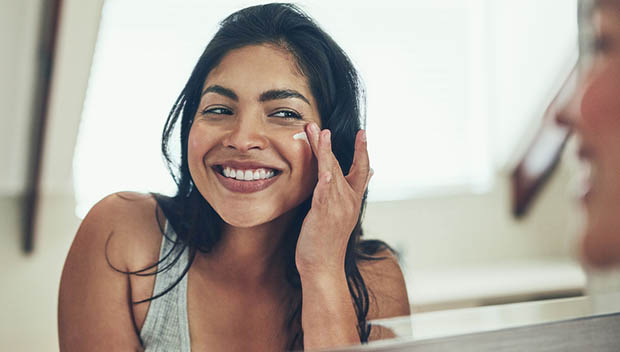
As runners, we take care of our bodies and prepare them for challenges through training and proper nutrition. But there might be one thing you're forgetting: taking care of your skin. We put it through trials and tribulations, from the unrelenting sun to frigid wind. However, with thousands of skin care products, it's hard to know where to start. Charcoal masks? Rejuvenating skin cream?
Let's start with the basics—protecting and cleaning your skin. Austin-area skin care expert and makeup artist Denise Vega walks through a daily skin care routine for runners and answers some common questions.
Running Events Near You
Daily Skin Routine
Waking Up: Give your face a refreshing wash. If you go to bed with a nighttime moisturizer, rinse it off before your run as leaving it on will make it harder to sweat. The warm water will also help wake you up.
Before Your Run: If it is sunny outside, apply a light (chemical or physical) sunscreen or wear a hat to protect your face. Prepare a water bottle to have after your run to rehydrate.
After Your Run: Start by rehydrating, then get your face squeaky clean. Cleaning your face can be as simple as using a facial cleansing cloth if you are on the go or rinsing with enough water to remove dirt and sweat.
If you want to do more, you can always do a multi-step skincare routine (cleanse, tone, eye cream, then moisturize). Avoid using very hot water on your face in the shower as the heat will cause skin to dry out even more. Give yourself 10 to 15 minutes to let your skin air dry and get back to a normal temperature before applying any BB cream, concealer or foundation.
Runner Skin Care Q&A
How do I get my skin redness down?
Redness can come from a few different sources, but using a cool damp cloth to soothe the skin can help reduce inflammation and tone down the redness quite quickly. You should use a weekly face mask that is calming and targeted to reduce redness, like a cucumber and oat face mask. Also, using a facial roller can help soothe skin and feels amazing after a workout if you keep it in the fridge. Introducing products with Vitamin C into skincare can help reduce redness too.
Should I wear sunscreen on my face when I run? But it burns!
Absolutely! You should be wearing SPF every day, especially if you are going to be in the sun. Find a formula that isn't going to burn, like a physical sunscreen instead of a chemical one. Physical sunscreen works by sitting on top of the skin to deflect and scatter damaging UVA rays away from the skin. However, it does not do well with a profuse amount of sweat. You should also use a hat and sunglasses to protect your face.
What are the three simplest things I can do for better skin as a runner?
A light exfoliation, moisturizer and SPF are your best weapons.
What should I avoid using after a run on my skin?
You should avoid using hot water or staying in the sun.
Are there any natural remedies for chapped skin from wind burn or sunburn?
Using sunscreen, a facial oil and a lip mask (some even have SPF) during the run could be very beneficial. You could also use a bandana to cover the skin that could get burned from the wind.
What is one thing runners probably don't know about skin care?
To avoid wearing any makeup during any exercise. Pores open during a workout and any makeup on the skin will get in and can cause breakouts. There is a brand called Sweat that is specifically formulated for people who want a little something on during a workout.
What makeup makes the most impact but requires the least amount of work?
Concealer! It is more pigmented than a foundation but in small amounts can give a very natural look. You can blend it in with your fingers and run out the door.
I am running 26.2 miles in the cold. What should I do to protect my skin?
No matter the weather, SPF is key. In the cold weather, you are more susceptible to dryness, so moisturizer and a facial oil are crucial. If you have oily skin, you are still prone to dehydrated skin. Try a night cream before bed and a light moisturizer in the morning. Lastly, for the rest of your body, "Waxelene" can be used temporarily to protect the skin from wind burn, but it also seals the skin and should not be used long term.
READ THIS NEXT: The 7 Worst Foods for Your Skin


